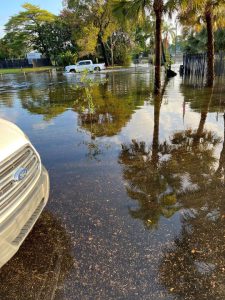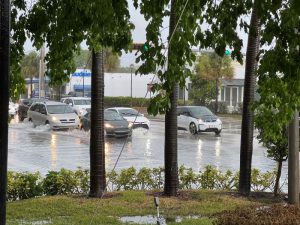Broward County Florida experienced unprecedented, historic flooding, like we have never seen before. We had repeated flash flood and tornado warnings which weren’t for the faint of heart. The downpour of rain didn’t seem to stop. The skies opened and the 25+ inches of rain seemed to come out of nowhere.
Vehicles stalled and were abandoned in the middle of the road, due to the extreme flooding. The FLL airport turned into what looked like a lake. Flooding forced the airport to shut down. Some homes, backyards, neighborhoods, office complexes, and businesses flooded. Roofs leaked and some caved in. Those residents experiencing the worst of mother-nature had to be rescued and evacuated with what they had on their backs.
Families and consumers were caught off guard, with so much standing water. The nightmarish days of downpours created very dangerous conditions. With existing stress and mental health issues at high levels already in our communities, this burden is something else to overcome. No matter how you look at it, high standing water and its resulting damage is not easy to deal with.
Here are some things to consider when experiencing extreme flooding.

10 tips to mitigate extreme flooding:
- Stay informed. Sign up for phone and text message alerts. Follow advisories and closure announcements.
- Don’t drive in flood water. Some vehicles ride low to the ground, others higher. It is unknown what is under the water and lane lines are no longer visible. Driving through flooded areas can damage your vehicle and result in costly repairs and even loss of life. Large vehicles stalled out in flood water too. Use extreme caution when driving around stalled, abandoned vehicles.
- Avoid speeding past other vehicles in flooded streets. This can cause loss of visibility and large waves, putting moving traffic and any pedestrians in danger. Driving quickly through water creates a potentially harmful wake for other vehicles, homeowners, and any nearby pedestrians. Be courteous and considerate on the road.
- Don’t walk and/or play in flood water. Don’t let kids play in standing water, even though it looks like fun. It may be dangerous. Snakes, sewage from backed up systems, sharp objects, bacteria and hazardous chemicals can be found in and/or contaminate flood water. Bacteria can enter your body through a cut or open wound. I have heard of some alligator sightings, and this poses another type of risk. Watch for fallen power lines. Be sensible and stay safe and healthy.
- Keep medications, emergency numbers and important documents handy and ready-to-go in a waterproof container. Use zip type plastic bags and put them into a lightweight backpack. It is always good to have a “to-go” bag, ready to use in the event unexpected evacuation is needed. https://blogs.ifas.ufl.edu/browardco/2022/05/12/hurricane-readiness-for-families-consumers-and-pets/
- Keep extra supplies on hand. Focus on nonperishable foods, formula and diapers for infants, medications especially for the elderly and food for pets. In Florida, we are used to having a supply of water and food in our pantries, as part of our hurricane preparedness efforts. We never know when disaster is going to strike.
- Keep flood, homeowners, and vehicle insurance up-to-date and in a safe, accessible place. Cars can get totaled when submerged in flood water. Homes and contents can be damaged and/or lost too. It is reassuring to know that your insurance is paid, current and up to date. Keep insurance cards and contact numbers handy. Set an alert on your phone to check insurance status annually. Keep photos of your property and the resulting damage.
- Think about the animals. Horses, cattle, and other large animals need our help during disasters. Keep vet phone numbers available and know what to do when flood waters arrive. See more information in the resource(s) section.

9. Be resilient. Keep your cool. Engage in self-care. It can be challenging when faced with unforeseen disaster. Some stop and cry and others act. We all react to stress differently. Do your best to control stress, emotional outbursts, and expressions of temper. Take a deep breath when the worst elements of frustration take over. Your mental health is important. Be an optimistic person. Happy days will emerge again, as will the sun. Seek help when needed.
10. Be kind. I have seen wonderful, heartwarming stories of people helping people. Strangers have gratefully assisted strangers evacuating homes with only their clothes on their back. It’s humanity at its best. Disasters can bring people together. Help each other out when you can.

Good news!
There are plenty of resources available to assist, increase awareness, and educate. After disaster strikes, it can become a challenge to assess and determine what the next steps are when things become overwhelming. I’ve compiled a list of resources with assistance from UF/IFAS Extension’s, Extension Disaster Education Network (EDEN), which provides great support and evidence-based information.
What do you need?
Here are some resources to learn more.
Disaster.ifas.ufl.edu – https://disaster.ifas.ufl.edu/
Homeowner Handbook – https://disaster.ifas.ufl.edu/search-result/?q=flood#:~:text=Florida%2DHomeowners%2DHandbook.pdf
Meals and Menu Planning During a Disaster – https://blogs.ifas.ufl.edu/browardco/2020/06/01/hurricane-preparedness-meal-and-menu-planning/
Think Nutrition During Hurricane Season – https://sfyl.ifas.ufl.edu/media/sfylifasufledu/broward/docs/pdfs/fcs/other-pdfs/Think-Nutrition-During-a-Hurricane_BMJ.pdf
Consume Safe Drinking Water – https://blogs.ifas.ufl.edu/browardco/2021/02/17/consume-safe-drinking-water-during-an-emergency/
Creating Your Disaster Kit – https://sfyl.ifas.ufl.edu/media/sfylifasufledu/broward/docs/pdfs/fcs/other-pdfs/Fact-S-EN-Disaster-Preparedness–Kit.pdf
Disaster Prep and Planning – https://sfyl.ifas.ufl.edu/media/sfylifasufledu/broward/docs/pdfs/fcs/other-pdfs/Disaster-Prep–Planning.pdf
Focus on Self-care – https://blogs.ifas.ufl.edu/browardco/2021/07/26/time-to-focus-on-self-care/
UGA; Mold – https://site.extension.uga.edu/hie/mold/
Closing your seasonal home – https://edis.ifas.ufl.edu/publication/HE887
Hurricane Readiness – https://blogs.ifas.ufl.edu/browardco/2022/05/12/hurricane-readiness-for-families-consumers-and-pets/
Saltwater Intrusion – https://edis.ifas.ufl.edu/publication/AE572
Flood damage to vegetables – https://edis.ifas.ufl.edu/publication/SS425
Tropical Fruit and Flooding – https://edis.ifas.ufl.edu/publication/HS202
Other Flood EDIS – https://edis.ifas.ufl.edu/entity/topic/flood
Texas Help/ TAMU – Livestock and floods – https://texashelp.tamu.edu/browse/disaster-recovery-information/livestock-preparedness-recovery/
Texas Help/ TAMU – Flooding website – https://texashelp.tamu.edu/browse/by-type/naturally-occurring/floods/
EPA – https://www.epa.gov/flooded-homes
Hotlines – Suicide hotline: 998; Emergency number: 911; Dial 211 for resources in Broward County.
An equal opportunity institution.
 15
15
